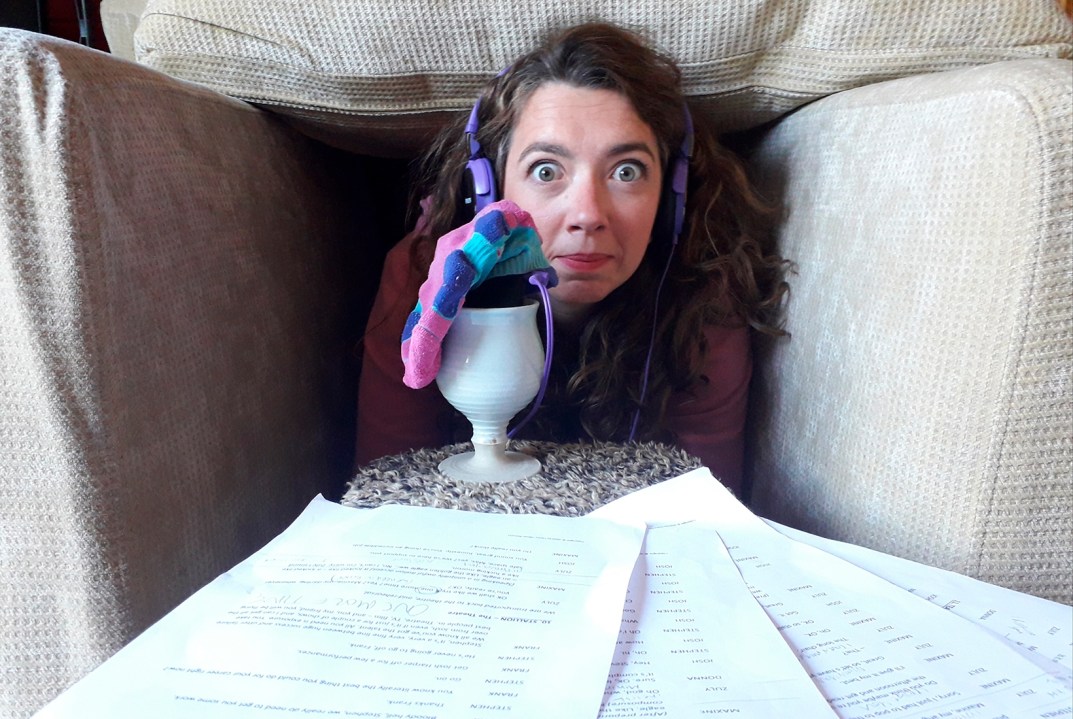Hats off to the Lawrence Batley Theatre for producing a brand-new full-length show on-line. Stephen Fry, with avuncular fruitiness, narrates a dramatisation of David Nicholls’s novel The Understudy, published in 2005. It’s a back-stage comedy about a newly written sex romp inspired by the life of Lord Byron.
The show, predictably enough, is entitled, Mad, Bad And Dangerous To Know. Here’s an excerpt. Byron is lying athwart his naked Italian mistress when the Muse summons him to draft a sonnet. ‘I must write here,’ he declares, ‘between a pair of pert peaches nestled.’ This doesn’t quite catch the tone of period drama in its present form. A modern playwright tackling Byron would want to focus on his sexual fluidity, his reputation as a molester and his record of culturally misappropriating the habits and clothing of communities to which he didn’t belong.
The purpose of Mad, Bad And Dangerous To Know is to offer a star vehicle to international heart-throb Josh Harper, known as ‘the 12th sexiest man in the world’. Josh is an amusing caricature — a tactless, greedy, narcissistic philanderer with a good line in self-justification. ‘Ninety per cent of the time I’m 100 per cent monogamous.’ He hopes the LBGTQ community will flock to see his Byron. ‘Got to keep my adoring gays happy.’ And he doesn’t intend to explore his subject’s character beyond ‘milking the shit out of that club foot’.
But Josh isn’t the subject of the story. Instead, the narrative focuses on the travails of his understudy, Stephen, a meek dullard whom Josh mocks openly during rehearsals. ‘Balls it up as often as you like, you’ll get it right eventually.’
It feels like a project the BBC might have considered 30 years ago and turned down
After a tiresome introduction, which lasts about as long as Newsnight, the plot finally begins. Stephen realises that his role as an understudy might boost his career. ‘Take over from Josh for a few performances,’ says his crafty agent, ‘and I can get all the best people in TV, theatre and film. You, my friend, will be flying.’ This promise, like many of the incidental details, rings false. An understudy wouldn’t attract ‘the best people’ because they will already have attended press night and seen the star himself.
The story plods on as Stephen tries to eclipse his rival while politely attempting to seduce Josh’s depressive (and depressing) wife, Nora. Meanwhile, Josh has to fight off squads of groupies who use chat-up lines like ‘I want some Byron in my mouth’. If you can bear that kind of quip, and if you don’t object to casual swearing, you may appreciate this 90-minute sitcom. It feels like a project the BBC might have considered 30 years ago and turned down.
Paines Plough has commissioned several playwrights to respond to the lockdown. Simon Stephens contributed a seven–minute monologue, She Left Home For A While, performed brilliantly by David Bradley. In a plain room sits an inscrutable pensioner. ‘Everything changed’, he says, ‘after she left home.’ Who is she? Wife? Daughter? Cook? Escaped sex-slave? No clues are given. ‘I watched a surprising amount of old football matches on the internet,’ he says wryly. Later his talk becomes bombastic as he starts to define ‘home’ in terms of its contraries. ‘It’s not a point on a surface of a rotating sphere, orbiting a ferocious sun, orbiting a galactic core in an expanding universe,’ he burbles.
The play contains no climax or transformation. Cobweb-thin. The same is true of Skype d8 by Travis Alabanza. A young woman complains about meeting men online. ‘Screw dressing up specifically for a man. Nooo. We don’t do that,’ she scolds. Yet she’s deeply concerned about the signals her wardrobe will send. ‘Matching sweats with trackies tells him you’re one of those hot people who can do trackies and hot without really trying.’
If she opts for a dress he’ll appreciate ‘the effort I made to go from my kitchen to my bedroom’. No he won’t. Men don’t look at clothes like a treasure map that carries the secrets of a woman’s personality. Men are blind to colour, fabric, texture, cut and finish. The only quality they notice is tightness. Clingy garments are appreciated because they offer reliable data about their contents.
This monologue trickles along for five minutes and then runs out of puff. Is it even a piece of drama? No, it’s a Facebook video. And yet it was produced by the Bush Theatre, which might have made a greater effort to explore the only creative avenue currently available to the profession.
Many theatre-makers seem to be hoping that a vaccine or some kind of blood test will solve the present crisis. Let’s hope so. But matters won’t rest there. The arrival of another virus within five years is statistically highly likely. Within ten years, it’s almost inevitable. Theatre may not survive the second blow.








Comments